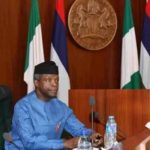Vice-President Yemi Osinbajo says Nigeria’s population growth will cause many challenges.
This comes just as the National Population Commission revealed recently that Nigeria’s population grew by nearly 50 million in 12 years.
He, therefore, called on the World Health Organisation to make Nigeria a priority
Osinbajo made the request when he received in audience, the Director General of the WHO, Dr. Tedros Ghebreyesus; regional directors and other global policy group members of the WHO at the Presidential Villa in Abuja Wednesday.
The Vice-President said, “We are in challenging times and in the next decade or two, we will have more challenges given that the population is growing and this calls for a lot of work especially with regards to health of our citizens.”
Osinbajo said Nigeria would ensure that its plan for the health sector would correspond with the WHO’s goals.
He said, “Our focus on universal health care is in line with the WHO’s vision and is one that we have chosen deliberately and there is no question in our minds that it is the way to go.”
On polio eradication, Osinbajo promised the WHO that Nigeria would continue to work with relevant stakeholders with a fair amount of success to reach vulnerable children in areas made inaccessible due to insecurity.
He added, “We want to be as vigorous as possible and progress achieved will be irreversible”.
In her remarks, Dr Matshidiso Moeti, WHO Regional Director for Africa urged the Nigerian government to transition the huge investments by donors and partners beyond polio eradication to saving lives and impacting positively on people’s health.
Meanwhile, WHO has advised the government at all levels to tackle poverty by investing in the health sector.
The Director General of the WHO, Tedros Ghebreyesus, said this at the roundtable media parley organised by Thursday in Abuja on Thursday.
Speaking at the event with the theme, ‘Journey to Universal Health Coverage in Nigeria,’ the WHO DG said Nigeria could not afford not to fund the health sector adequately because an unhealthy nation will continually remain poor.
He said, “The question therefore is not whether countries can afford to invest in their health systems; the question is whether they can afford not to.
“Universal Health Coverage is not just an investment in a healthier future; it’s a down payment on a fairer, safer and more prosperous future.”
Ghebreyesus commended the Federal Government for allocating one per cent of the Consolidated Revenue Fund from the national budget to the Basic Healthcare Provision Fund.
He subsequently inaugurated the Basic Healthcare Provision Fund otherwise known as ‘Huwe,’ which means life in Ebira language.
The WHO FG noted that the establishment of the BHCPF provides a great opportunity to turn political commitment into tangible gains, and to rally partners and the private sector around revitalising primary health care as the foundation of achieving UHC.
In his remarks, the Minister of Health, Prof. Isaac Adewole, said the Federal Government would implement the BHCPF or Huwe by starting with three states in 2018. They include: Abia, Niger and Osun states.
He said the states were chosen following a readiness assessment exercise that was conducted, adding that they had demonstrated commitment to the scheme by contributing N100m each.
Adewole, however, advised states not to reduce their respective health budgets because of Huwe as the project was to complement the efforts of the states and not replace health programmes.



